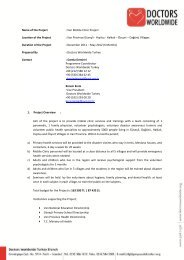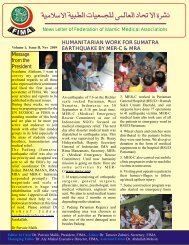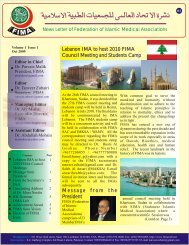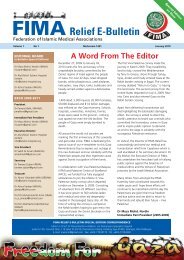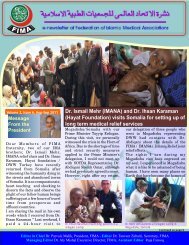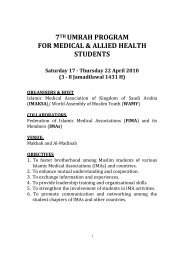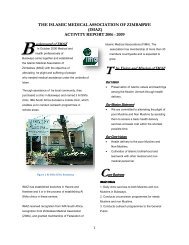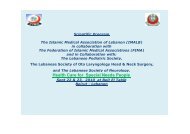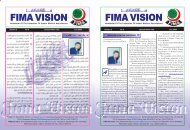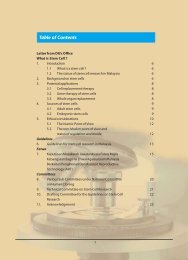FIMA Year Book 2009 - Federation of Islamic Medical Associations
FIMA Year Book 2009 - Federation of Islamic Medical Associations
FIMA Year Book 2009 - Federation of Islamic Medical Associations
You also want an ePaper? Increase the reach of your titles
YUMPU automatically turns print PDFs into web optimized ePapers that Google loves.
Clinicians As Effective ResearchersIntroductionIn December 2006, I was asked to helpdevelop the research program at KingFahd <strong>Medical</strong> City (KFMC), a newtertiary care hospital in Riyadh, SaudiArabia, consisting <strong>of</strong> four hospitals— general, rehabilitation, women’s,children’s — staffed by pr<strong>of</strong>essionalsfrom all parts <strong>of</strong> the world. As I beganto establish the institutional reviewboard (IRB) and plant the seeds fora research enterprise, some <strong>of</strong> thefrequently heard responses were: “Whybother doing research in a clinicallyoriented hospital devoted to patientcare?” “We are clinically oriented anddo not have the expertise or know-howto do meaningful research.” “We donot have the time.” “We already have ajob.” “Give me the space and staff and Iwill do the research.” I could add manymore comments to the ones listed.As I began to ponder the strategy todevelop and answer some <strong>of</strong> thesereal concerns, I reflected on my ownexperience in the United States, whereafter basic medical training in Kashmir,with no experience in research, I endedup, unplanned I might add, doing a fairamount <strong>of</strong> clinical research. Over a twodecade period, the research resultedin substantial grants and publications,including some original observations.I reflected on the studies that resultedin grants totaling more than U.S. $2.5million from the National Institutes<strong>of</strong> Health (NIH), World HealthOrganization (WHO), AmericanLung Association, and pharmaceuticalsponsors. Additionally, as chair <strong>of</strong>medicine at Nassau County <strong>Medical</strong>Center in New York, my departmentreceived an additional $4 million ingrants for the state’s primary careupweighting program and the HIV/AIDS Designated Center.As I shared my experience with theinterested staff at KFMC, the interestslowly started to blossom. One <strong>of</strong> themost popular presentations I madeat KFMC and other institutions was“Clinicians as Effective Researchers.” Inthis article, I will briefly outline the keycharacteristics <strong>of</strong> a successful clinicalresearcher, relying heavily upon mypersonal experience. Clinicians needa supportive environment within theinstitution and also a country thatunderstands and invests in research anddevelopment with the anticipation <strong>of</strong>long-term benefits for the community.The institutional and national prioritieswill not be addressed in detail in thisarticle.Individual’s RoleThe key element needed in a researcheris curiosity. The researcher should notbe afraid to ask questions and shouldbe willing to follow through and takechances. A few historical examples willbring home this point:Werner ForssmannIn 1929, Werner Forssmann, 25-yearoldintern from Germany, had beendeeply impressed by a sketch in hisphysiology textbook showing a French<strong>FIMA</strong> <strong>Year</strong><strong>Book</strong> <strong>2009</strong>128




